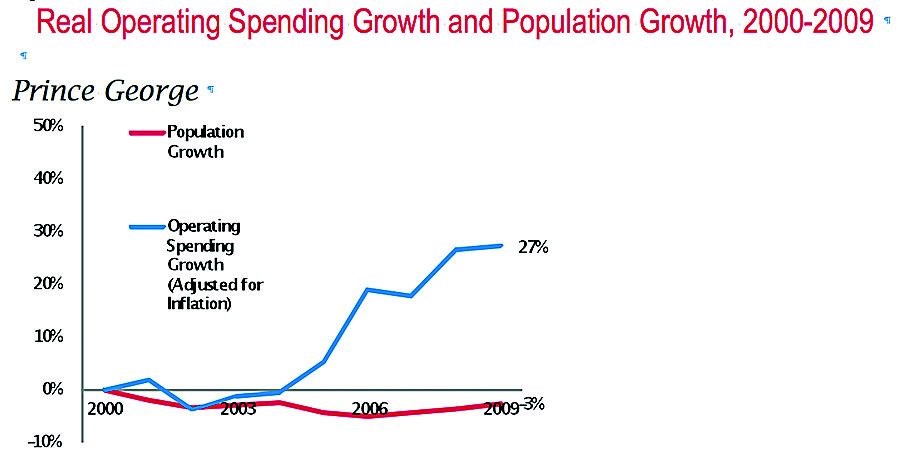The City of Prince George has improved its rankings for spending -now the municipality is only ninth worst in the province.
Prince George dropped from the worst spending offender in a 2010 Canadian Federation of Independent Business's (CFIB) study to ninth worst in a follow up report released Monday among 29 B.C. communities home to at least 25,000 people.
The ranking of municipal spending is compared to population growth.
At first glance, the report does not paint a pretty picture.
Between 2000 and 2009, per capita spending in the city rose 31 per cent, to $1,516 from $992, even though Prince George's population declined three per cent over that time.
But dig a little deeper and the numbers appear to be leveling off, and even slightly declining.
From 2008, the last year of the previous council, to 2009, the first year of this current council, per capita operating spending declined by $9 per person.
The declining trend, however modest, gave Mayor Dan Rogers a positive impression.
"We've made strides for 2009, which was the first full year that I was mayor and the current council was in place," Rogers said.
Rogers said he agreed with the CFIB's assertion that municipalities need to stop relying on the general tax levy to pay for services.
"I'm open to looking at new sources of revenue, whether it's revenue that we'll get through the district energy system or even potential beer sales at CN Centre," Rogers said.
"If that produces new revenue, that allows us to keep operating costs down and keep taxes in the long term in check."
Rogers's main challenger, Coun. Shari Green, noted the CFIB puts a "core review" of municipal expenses and services at the top of its suggestions for dealing with the issue.
"That's exactly what I've been talking about for some time," Green said, adding other cities having taken the step found "tremendous opportunities to save."
In her platform, Green calls for directing department heads to find up to 10 per cent savings within every department of City Hall. But she has also stressed it won't necessarily mean cutting staff.
"There are other ways to be efficient in operations," Green said.
Rogers alluded to Green's failed effort to get a stand-alone arena built at Exhibition Park, which would have cost $6.8 million more than renovating Kin 1 in preparation for the 2015 Canada Winter Games.
"I'd like to see a rink in every back yard but we have to be responsible with our fiscal management," said Rogers, who was a vocal opponent of the proposal and prompted a second look at the issue by council that saw enough change their minds to scrap the idea.
But Green said opting for a renovation over a new arena was "a perfect example of not challenging staff to do more for the same dollars."
"By working in a team approach, we had the opportunity for a new arena to be built for the same dollars, and operating costs covered by increased user fees," Green said. "Instead, Dan Rogers forced a reconsideration, which meant the work to get innovative in how we approached that project spending was forbidden and never explored.
"We'll never know now if it was a better choice."
The race's four other mayoral candidates also have thoughts on tackling growing spending.
Brandon Lewis called for an "in-depth and analytical look at the budget and see where we might be able to make adjustments."
He also said simply drawing more people to Prince George will help expand the city's tax base to pay for services.
Bruce Fader argued steps could be taken to reduce the cost of water and sewer. He favours getting rid of injecting fluoride into the water supply and allowing homeowner to grow their grass a little taller.
"Once grass is around three inches, it's self sustaining," Fader said.
Alex Huber said City Hall should look at contracting out more of its services, particularly for snow removal and street maintenance.
Eugene Fetterly emphasized getting a better handle on the cost of capital projects. Based on past history, he predicted the new RCMP detachment and the community energy system will end up over budget.
He also they're being pursued too aggressively.
"The only way we're going to save money is to slow down on these capital projects," Fetterly said.

.png;w=120;h=80;mode=crop)

